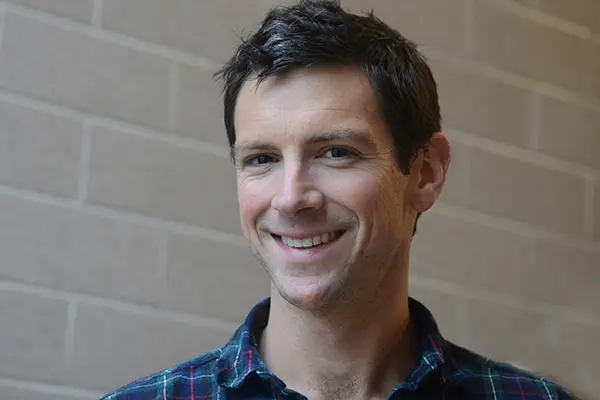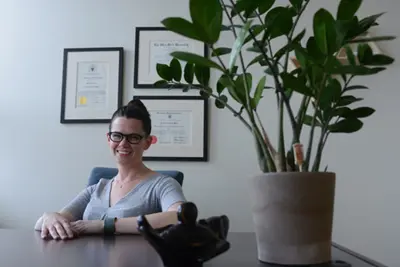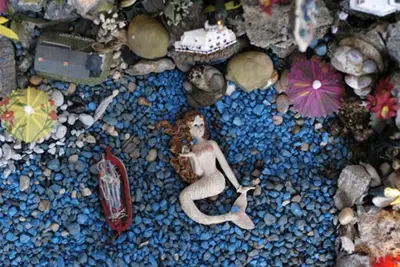Kaag’s Book on Worthwhile Life Earns Kudos
 Image by Tory Germann
Image by Tory Germann
05/18/2018
By Katharine Webster
Department Chair John Kaag brings philosophy into the public arena to help inform political discourse. He pens essays for The New York Times “Opinionator” column and other outlets, applying philosophical reasoning to everything from the ethics of drone warfare to academic free speech and gender politics, sometimes with his colleague (and spouse), Assoc. Prof. Carol Hay.
His book, “American Philosophy: A Love Story,” won NPR's Best Book of the Year, New York Times Editor Choice and a Kirkus star for its elegant chronicling of Kaag’s life as he wrestles with a profound existential question: “Is life worth living?” and discovers a deteriorating private library in New Hampshire once owned by Harvard philosopher William Ernest Hocking. In Kaag’s quest to save the library, he traces major streams of thought and influence in American philosophy and his own emotional journey toward living a meaningful life.
In 2018, the book also won the John Dewey Prize for Best Book in American Intellectual History, which is awarded every two years by the U.S Society for Intellectual History.
Q: In your book, you demonstrate the value of philosophy in your own life. How do you persuade undergraduates that it’s important?
A: I teach Introduction to Philosophy every semester, by choice. The first day I ask my students, “Why are you here?” and they say, “I’m here because I need credits and I want to graduate and get a job.” They answer literally by talking about the instrumental value of taking the class. But philosophy gives us the chance to ask the question differently and provide more meaningful answers.
So I ask my students to imagine that at the end of class, they step out on Broadway and get hit by a bus: “What if you die and don’t get to do any of those things?” That’s the beginning of considering the really hard existential questions: “Who am I?” and “Why am I here?” At its best, philosophy moves us away from thinking about simply instrumental goals, like money and power and fame and physical beauty, and starting to think about intrinsic goods that make life worth living, like justice and freedom and goodness and living a beautiful life.
 Image by John Kaag
Image by John Kaag
Q: Isn’t that a lot to ask of first-year students who may be preoccupied with other concerns, such as adjusting to college life, making friends or finding a part-time job?
A: Actually, students love that first class – they love talking about their own mortality! Good philosophy classes ask the tough questions, but also give students a safe and supportive place to ask them. I tell my students, “This is just spring training for the rest of your life. You get to ask the really hard questions in this environment, like ‘What’s the meaning of life?’ or ‘Am I a moral person?’ Those are all questions you’re eventually going to have to ask in real life – and that’s really tough if you’ve not had spring training.”
Q: In your book you ask, “Is life worth living?” At the end, you agree with William James, the father of American philosophy and psychology, that the answer is “Maybe,” and that it’s up to us to make our lives worthwhile. What are the questions that interest you now?
A: “Where did you come from?” is another existential question that interests me – the way the past both constrains us, but also creates the context for our free actions. All of us have pasts and histories. Good or bad, they constrain who we are, but then they also create the context for us to become something else. That’s in part what the book is about: going through a divorce and dealing with my father, who died at the beginning, and then meeting Carol and falling in love again and starting a family.
Other questions that interest me today are, “What is inequality and how does it play itself out in contemporary life?” and “What is a just war?” The last question led me into writing about drone warfare for a while. Philosophers are supposed to be in the business of asking the questions that should be most important to society, like “How does technology affect the way we think, but then also affect what we consider to be good and true?” These are all questions I think students are really excited to ask, especially our large number of engineering students.
 Image by Anthony Sampas
Image by Anthony Sampas
 Image by Anthony Sampas
Image by Anthony Sampas
Q: What happened to the library and the books the Hocking family donated to UMass Lowell?
A: The Hockings donated more than 200 philosophy books, most of them 17th- and 18th-century first editions that were annotated by Hocking or other major philosophers, to UMass Lowell. They’re now in the special collections and available to students and scholars. The Hockings donated all of their father’s correspondence and papers to Harvard, which has his own father’s papers. They kept all the literary works: They still have about 10,000 books and they’re trying to find an institutional or university sponsor to help them restore and maintain the library, which is an extraordinary collection.
Q: What’s your next book about?
A: The title is “Hiking with Nietzsche.” When I was 19 and traveling abroad for the first time, I was working on my master’s/honors thesis on genius and insanity through Emerson and Nietzsche, so I followed Nietzsche’s footsteps and hiked from Basel, Switzerland, to Rome, Italy. This summer, we returned to Sils-Maria in Switzerland, where Nietzsche spent his summers, to hike again as a family. As a quietly rebellious teenager, I was drawn to Nietzsche because I saw him as so hell-bent on individual freedom that he laid waste to any relationship or institution, regardless of how it might give meaning to many people’s lives. That’s a common misconception, and I now see that his arguments are more complex. So the book is a story about how I tried to grow up as a philosopher. It’s also a meditation on freedom and parenthood – how to think about freedom in adulthood.



